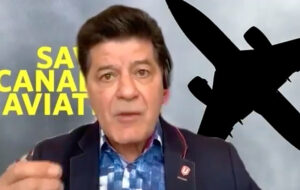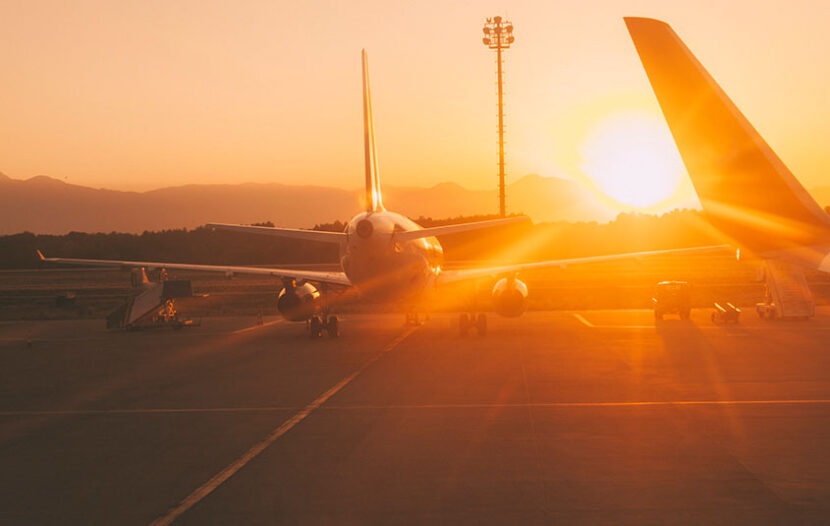TORONTO — More than four months after the federal government announced the start of talks on a financial assistance package for the airlines – and at the one-year mark for the shutdown of the airlines and travel industries – there are increasingly urgent calls for the government to take action.
In a Facebook Live yesterday, Unifor National President Jerry Dias noted the one-year anniversary since Canada’s borders closed to non-essential travel, putting the aviation and travel industries in a tailspin. “It’s been a year since capacity plummeted, and travel ground to an almost complete halt,” he said.

Unifor National President Jerry Dias, March 16, 2021
“We’ve worked with employers and experts to present sensible options for the government,” said Dias. “One year of inaction is a shameful anniversary. What is the federal government waiting for?”
Unifor is Canada’s largest union in the private sector, representing 315,000 workers in every major area of the economy, including the airline industry. In recent weeks Dias has given multiple interviews with the consumer media, highlighting everything from Air Canada’s commitment to offer refunds as a condition of a bailout (Air Canada has already refunded more than $1 billion in refundable tickets since the start of 2020), to the bailout price tag, potentially as high as $9 billion.
“Look, we get it. The governments were erring on the side of caution as they should,” said Dias in his Facebook Live. “They were preoccupied with the pandemic as they should have been. But we’re in a critical situation today where we are really demanding action.”
Thousands of aviation industry workers have lost their employee benefits, or been laid off, he said.
“It’s been devastating for so many people and we’ve been told, countless times, the solution is imminent, that the government’s plan will be rolled out shortly. The reality is, it hasn’t been rolled out at all. We’re still waiting.”
The federal government announced the start of discussions for a financial assistance package for Canada’s airline industry on Nov. 8, 2020. More than four months later, there’s still no final word on the package, although all indications, from ACTA to reports in the consumer press, suggest talks are in the final stages.
“It’s been over a year that we’ve been calling for action. A year we’ve been saying to the government, there’s going to be grave effects if there’s no plan,” said Dias.
The airline industry also needs time to ramp up capacity, to meet demand for when travel begins again in earnest, he said.
“We need a national recovery plan,” said Dias in his Facebook Live. “And we need to make sure the capacity is there.” Canadians are ready to travel, he added. “There’s no plan in place to make sure the capacity will be there.”
Dias noted that worldwide, governments have assisted their airline industries to the tune of $150 billion. “To date Canada has contributed less than $2 billion,” to help the Canadian airlines industry, he said, adding that “of all the G7 countries, only Italy has contributed less.”
TIME IS TICKING
Meanwhile in a column in the Toronto Sun, economist and Director of Operations for the Montreal Economic Institute, Miguel Ouellette calls out the federal government for taking so long to come to the airline industry’s aid.
He too points out that especially among G7 nations, Canada is lagging in its help for the airlines, putting Canada at an economic disadvantage.
Time is ticking, the airlines have lost billions and there’s an urgent need for the government’s financial assistance package, now, he says. Ouellette also calls for the loosening of travel restrictions and the elimination of the 3-day hotel quarantine rule.
FEDERAL FRACAS
Earlier this month the federal Conservatives called on the Liberals to provide targeted financial support for several sectors hardest-hit by the pandemic, including tourism.
However in follow-up questioning at his COVID-19 briefing on March 8 Prime Minister Justin Trudeau refused to be drawn into a discussion about targeted funding for hardest-hit sectors, saying that the federal government has provided broad financial assistance since the start of the pandemic.
When asked about financial assistance for hardest-hit sectors, Trudeau said: “Since the start of the pandemic we have delivered on our promise [to support Canadians] for as long as it takes, and as much as it takes.
He also noted that when it comes to financial assistance from the three levels of government for Canadians amid the pandemic, “$8 or $9 of every $10 has come from the federal government.”
Trudeau added that Canada’s airlines have received more than $1 billion in support since the start of the pandemic, and support for the tourism industry has included CERS and CEWS. The federal government has also implemented the HASCAP loan program for hardest-hit businesses, including travel and tourism.

